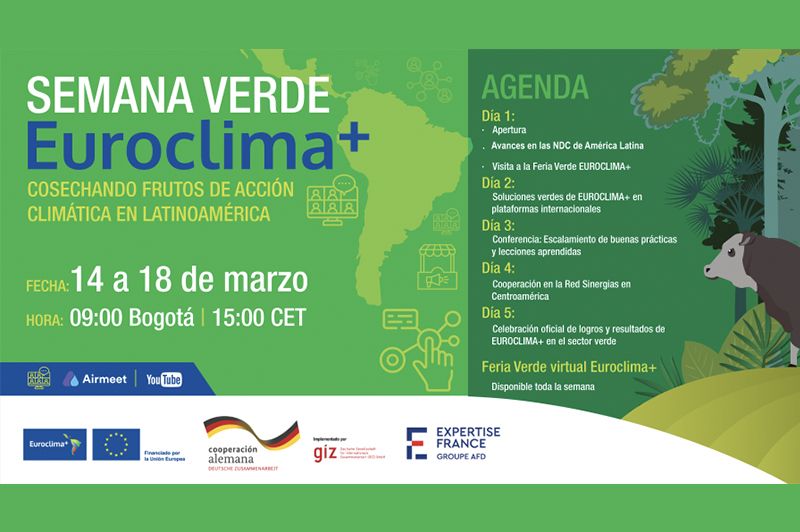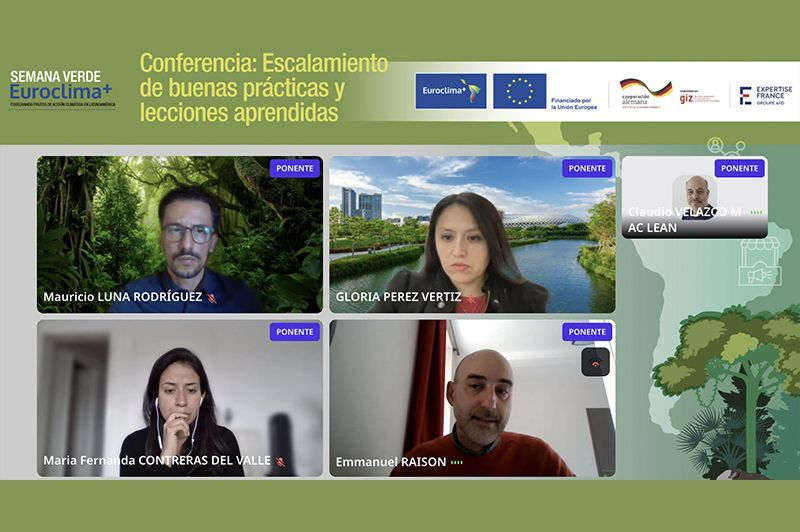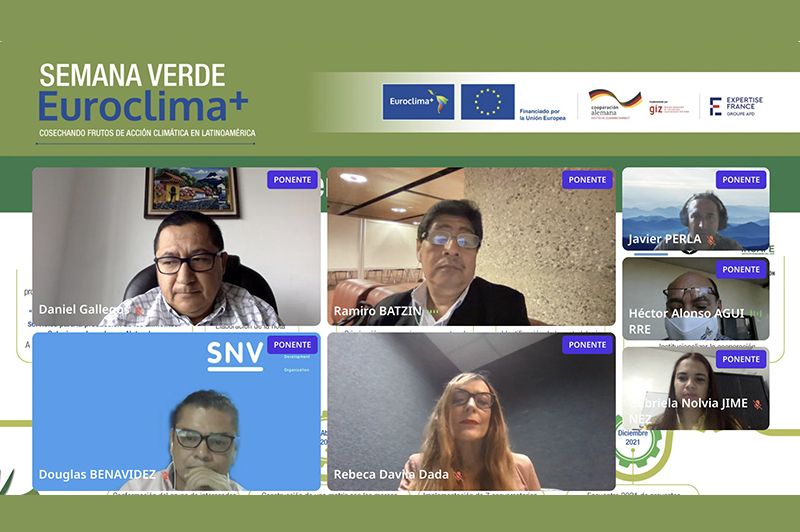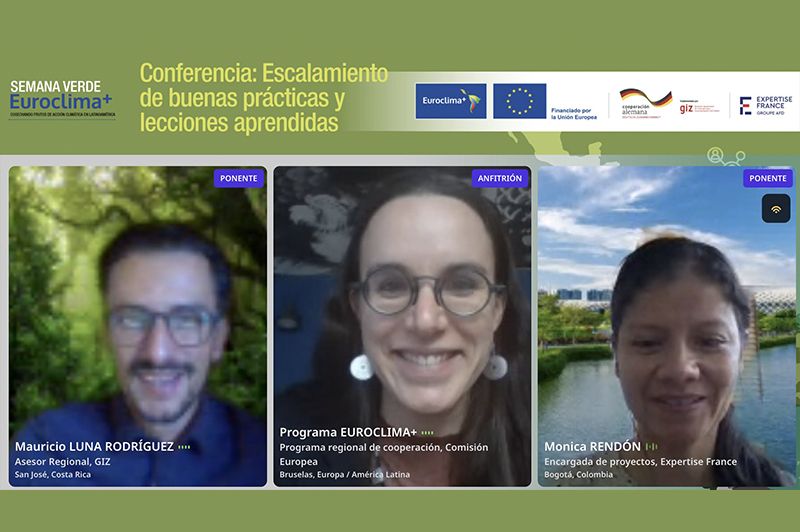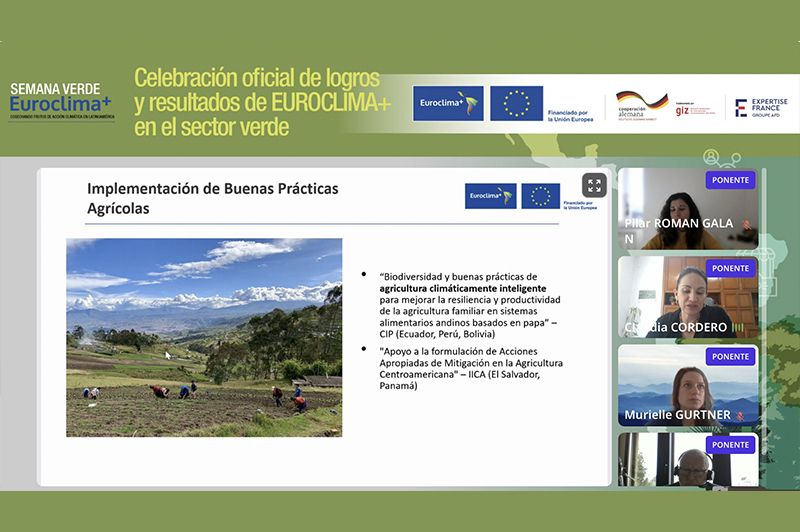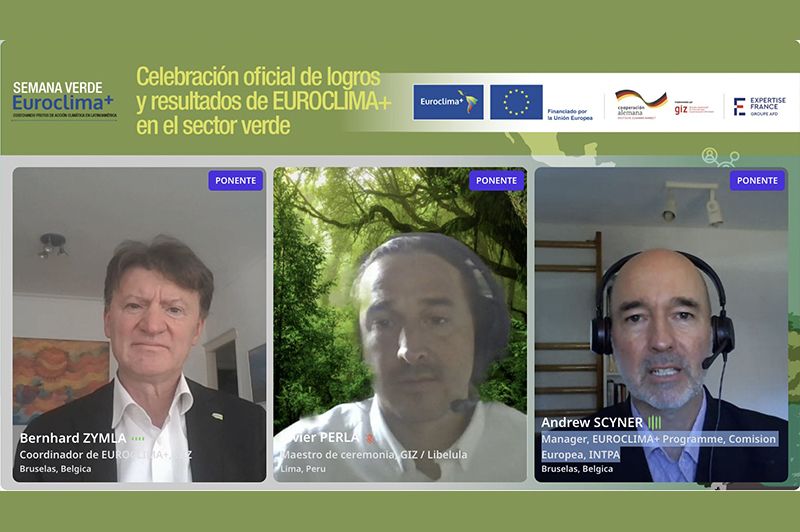During the "EUROCLIMA+ Green Week: Harvesting the Fruits of Climate Action in Latin America", it became evident how the BBE and PRA sectors managed to implement
19 projects, which in turn conserved ecosystems, made food systems more resilient, engaged and interconnected with diverse stakeholders, and added to climate action in the region.
18 March 2022. From 14 to 18 March, EUROCLIMA+ held the Green Week: Harvesting the Fruits of Climate Action in Latin America. This virtual event, which was attended by more than 180 people, presented the results of the EUROCLIMA+ Programme in the thematic sectors Forests, Biodiversity and Ecosystems (FBE) and Resilient Food Production (RFP), which through 19 projects implemented in 14 countries in Latin America and the Caribbean (Argentina, Bolivia, Brazil, Colombia, Costa Rica, Ecuador, El Salvador, Guatemala, Honduras, Mexico, Panama, Paraguay, Peru and Uruguay) contribute to the implementation of these countries' climate commitments, known as Nationally Determined Contributions (NDCs).
The event was organised by the agencies Expertise France and the German Society for International Cooperation (GIZ) GmbH, in a format characterised by different virtual environments (live conferences, green fair, meeting room) and numerous interaction tools, gathered on a virtual platform dedicated to the event and accessible all week long.
Highlights video
Day 1: Opening: Advances in Latin American NDCs
During the opening, the progress made on NDCs in the region was presented. Mauricio Luna, GIZ regional advisor, explained that through an analysis of the updated NDCs in the region, prepared by EUROCLIMA+, it has been identified that countries have managed to strengthen and scale up the sustainable use of nature for climate action. This allows projects implemented by the FBE and RFP sectors to increase their contribution to the climate agenda in the region.
In this context, it is important to understand the relevance of Nature-based Solutions (NbS) , which are actions aimed at protecting, managing and restoring natural or modified ecosystems in a sustainable manner, to mitigate, adapt to, or reduce the risks associated with climate change while simultaneously providing human well-being and biodiversity benefits.
“The countries present commitments that have to do with those conditions that facilitate the use of nature for climate action, and there is also a large presence of measures related to adaptation and mitigation in a synergistic way, which is one of the advantages of the NbS approach, that together they can contribute to adaptation and mitigation. We see this also in the projects of the Resilient Food Production (RFP) and Forests, Biodiversity and Ecosystems (FBE) sectors," explained Luna, who also highlighted some messages for the region on the relationship of NDCs with the NbS approach:
- The implementation of robust NbS requires net gain outcomes in biodiversity and ecosystem integrity, and the full participation of local stakeholders.
- The updated NDCs present commitments with an NbS approach that drives enabling conditions through public policies for the greater incorporation of nature for adaptation and mitigation.
- These enabling conditions are key to the more effective integration of nature for climate action in the realms of biodiversity and agriculture.
Nora Páez, head of the Adaptation Department in Paraguay, indicated that in her country there was some mistrust due to a lack of knowledge about the NbS concept and approach, but a better understanding has led to a rapprochement with multiple sectors, who are now aware of the multiple benefits they provide.
“We fought to keep the term NbS within the First Adaptation Communication reported in our NDC. From an NGO perspective, it was very welcome, but this was not initially the case in the private sector. However, from a technical point of view, I thought it was more pertinent to use the large umbrella that is the NbS concept and then orient it by sector," said Páez.
For her part, Katherine Martinez, Climate Change Adaptation analyst, explained that Panama was not aware of the number of times it had relied on NbS in the NDC, until a meeting was held with the EUROCLIMA+ GIZ team and an analysis of the NDC was presented. "We saw an opportunity to take action," she said.
“Panama saw the possibility of promoting nature-based solutions as a tool to achieve adequate adaptation, in addition to achieving national commitments to decarbonisation and the creation of green infrastructure," said Martínez.
|
RESOURCES DAY 1 Moderator: Javier Perla, Libélula Panellists: Mauricio Luna, Regional Advisor EUROCLIMA+, GIZ
|
Day 2: Knowledge platforms at the service of climate and biodiversity stakeholders
The role played by technology and digital platforms is becoming increasingly important and relevant in disseminating experiences and learning to address climate change. Knowing this reality, on the second day of the Green Week, the event "EUROCLIMA+ Green Solutions on International Platforms" was held, where the green solutions that the FBE and RFP sectors have contributed on the platforms Panorama - Solutions for a Healthy Planet and the Best Practices Database of the NDC Partnership were presented.
EUROCLIMA+ Green Solutions represent the systematisation of results, best practices and lessons learned that can be scaled up and replicated in other contexts and have the potential to promote countries' green recovery and accelerate the implementation of their NDCs.
Volker Koch, advisor for oceans and coasts at GIZ, explained that the creation of Panorama responds to a knowledge management initiative: "What we were looking for was to collect best practices that can provide good examples, recipes and ideas to be replicated and adapted to different contexts. In addition, it serves to find partners in various projects such as non-governmental organisations, communities, government agencies, and other actors," Koch explained.
For his part, Marcello Rachetti, from the Resilient Family Livestock project of the RFP sector, presented the solution on “Co-innovation and best practices for the climate resilience of family livestock farming in Uruguay”, which has improved the climate resilience of family livestock farming in two vulnerable agro-ecological regions of Uruguay: Basalto and Sierras del Este.
Alejandra Tenorio, from the FBE project Articulating Global Agendas from the Local , explained that as part of the actions they developed nature-based solutions for the adaptation of agricultural producers in Colima, Mexico, through riparian reforestation in flood-prone agricultural areas, which has a potential for replication in more than 900 municipalities in the country that are vulnerable to flooding.
Jesús Alvarado, consultant for the NDC Partnership, explained that they have a database of best practices that members in various countries have already implemented. "Compared to other tools, the NDC Partnership combines a series of case studies that show how they have worked and which thematically relate to projects, activities or programmes that directly contribute to NDCs in the country they are targeting," he said.
|
RESOURCES DAY 2 Moderator: Javier Perla, Libélula Panellists: Volker Koch, Oceans and Coasts Adviser at GIZ
|
Day 3: Scaling up best practices to tackle climate change
On the third day of the event, the meeting "Scaling up Best Practices and lessons learned" was held. Through the actions implemented by different projects, it was shown how it is possible to scale up results in the public policies of the countries of the region, and thus add to actions that allow addressing climate change at the regional level.
Clementine Moriceau, coordinator of the RFP sector for Expertise France, explained that as part of the Technical Assistance, the mandate is to systematise, and with this in mind, different processes of systematisation of best practices have been developed on cross-cutting themes for the 10 projects of the RFP sector.
For her part, Monica Rendón, Project Manager for Expertise France, mentioned that the study " Potential for Expansion of the FBE projects", showed some conclusions that move towards adaptation to climate change and green recovery. In addition, they integrate the multifunctionality of forests, income and employment generation, among others.
Gloria Pérez Vértiz, consultant, explained that through the study "Green Business Models in Food Value Chains", it was understood that green business models are those economic activities that generate positive environmental impacts, respect human and labour rights, and have a direct impact on some environmental objective.
For her part, Maria Fernanda Contreras, a consultant, added: "Moving towards green business models is possible if the implementers, as was the case with the RFP sector projects, have experience and a deep understanding of their context”
In addition, she highlighted that:
- There is potential for projects in the agri-food sector to strengthen their actions along the entire value chain, thereby broadening the impact on environmental objectives.
- Project implementers play a crucial role in the articulation of value chain actors.
- Strengthening intermediary actors within value chains and short circuits allows for a better positioning of producers in differentiated markets.
Claudio Velasco, consultant, commented that in the study "Experiences of co-creation in the implementation of NDCs in the agricultural sector", developed by the RFP sector, it was found that the experiences are common even with their particularities, and that they represent key elements for synergy co-creation models.
Velasco also stressed that in order to scale up and replicate best practices, it is necessary that the project design explicitly shows indicators of co-creation processes and that these are included in the monitoring and evaluation systems.
In the case of the replicability of projects in the FBE sector, Emmanuel Raison, consultant for Environment and International Cooperation, explained that there is no single recipe for scaling up projects. He indicated that the study "Scaling-up Potential of BBE Projects" emerged after an internal evaluation, an analysis of field experiences on adaptation and green recovery, which also integrates the multifunctionality of forests.
"A project that has been less successful could be more replicable than another if it has had a participatory systematisation process that allows learning to be recognised. If we are talking about scaling up, public policy is the ideal mechanism that will allow for greater scope and sustainability of the initiative. We have seen that it is possible to work at two levels: local municipal policies and national policies," Raison said.
|
RESOURCES DAY 3 Moderator: Mauricio Luna, GIZ Panellists: Clémentine Moriceau, Coordinator of the RFP Sector, Expertise France
|
Day 4: Synergies for climate action
On the fourth day of Green Week, the Synergies Network in the green sector of Central America was presented, which was formed by organisations implementing EUROCLIMA+ projects in the FBE and RFP sectors in the context of the Conference of the Parties (COP25) to the United Nations Framework Convention on Climate Change (UNFCCC); and which supports rural communities in Central America in their climate empowerment and in their processes of strengthening their resilience to the effects of climate change.
Douglas Benavidez, coordinator of the Climate-Smart Family Farming for Resilient Food Production project of the PRA sector, explained that it is important to transcend from the project to the organisations that have implemented it, and thus learn to create synergies between their actions.
"We have a context that is very affected by climate change in Latin America, from the small producer who is vulnerable, to their food systems and ecosystems that are affected," said Benavidez, who also highlighted the transcendental role of Expertise France and GIZ in making the Network's synergy operational.
Héctor Aguirre, from the Trinational Border Community of the Lempa River (MTFRL), explained that through the network, the possibility of exchanging experiences on processes related fundamentally to the storage of basic grains and commercialisation was identified.
"The Río Lempa company was created, a mixed public-private capital entity that buys grains from local producers' associations and makes these products available to the public in such a way that the market does not run out of supplies and prices are stabilised," Aguirre explained.
Rebeca Dávila, ICCO programme officer, explained that the SNV and ICCO institutions, which implement EUROCLIMA+ projects, seek, through voluntary carbon markets, to be a solution that provides economic incentives to small producers, guaranteeing the maintenance of plantations that are part of a reforestation that contributes to the NDCs.
"In the FBE sector, synergy facilitates scaling up, with lessons learned that save us time, economic resources, energy and contribute to South-South cooperation," Dávila emphasised.
Daniel Gallegos, director of the Forests, Biodiversity and Community Development project at CISP, said that the most important thing about the work in the Synergies Network was to complement the projects in the FBE and RFP sectors.
Gabriela Nolvia Jiménez, project management coordinator at the Honduran Coffee Institute (IHCAFE), said that before the creation of the synergies, training processes were being developed together with EUROCLIMA+ and the Technological University of Honduras, and in view of the challenges posed by the COVID-19 pandemic, a virtual learning migration had to be carried out.
"Together with the Trinational Border Community of Rio Lempa, a diploma course with an international curriculum was developed, and later on, networking processes will be implemented, with different educational and social benefits," she said.
|
RESOURCES DAY 4 Moderator: Javier Perla, Libélula Panellists: Douglas Benavidez, SNV Agriculture Leader and Coordinator of the Climate-Smart Family Farming for Resilient Food Production Project
|
Day 5: Contribution of EUROCLIMA+ to climate action through FBE and RFP
On the last day of Green Week, the results of the FBE and RFP sector projects were highlighted and it was emphasised that both have contributed to climate change adaptation and mitigation actions in Latin America and the Caribbean.
Andrew Scyner, EUROCLIMA+ Programme Manager, highlighted that the FBE and RFP sectors will continue to work through the Country Dialogues, a mechanism that identifies countries' climate priorities and supports the implementation of actions that contribute to the fulfilment of the NDCs.
He also explained that the impact achieved on public policies in the countries is a key indicator of the results of EUROCLIMA+.
Bernhard Zymla, GIZ coordinator for EUROCLIMA+, highlighted that actions on ecosystems, biodiversity and agriculture, and best practices, feed into the Country Dialogues. He also pointed out some key achievements:
- The RFP sector supports the adoption of resilient best production practices in the food value chain. Approximately 24,000 people have been trained, 32,000 people have been directly supported and 25 institutions have been directly supported by the projects.
- In the FBE sector, the resilience of vulnerable populations and ecosystems has been strengthened. More than 14,000 people have been trained in the sustainable use of ecosystems, 67,000 people have been directly supported and 34 institutions have been directly supported.
Michael Schlaifer, FBE technical advisor, indicated that the spirit of Expertise France has been to be part of the implementation of FBE sector projects as an element that stands out for teamwork, showing the opportunities by implementing concrete climate change adaptation measures.
In turn, the 9 FBE sector projects and their 3 extensions have succeeded in strengthening regional cooperation, dialogue and learning with innovative approaches to ecosystem-based and landscape-level climate change mitigation and adaptation, with a focus on resilience and communities.
Murielle Gurtner, EUROCLIMA+ projects coordinator at Expertise France, also explained that the FBE sector has strengthened institutional capacities for the integration of biodiversity and climate change aspects into sectoral and cross-cutting strategies, programmes and plans. And it has generated successful experiences that can be replicated in other countries.
The 10 RFP sector projects were aimed at improving capacities to increase resilience to climate change in the agricultural sector. In addition, best practices in agriculture, agroforestry and resilient livestock have been implemented, improving the efficiency of production systems in value chains.
Pilar Román Galán, coordinator of the FBE and RFP sectors at GIZ, indicated that both sectors share many similar lessons. She highlighted that the RFP projects have four important areas of action, which were identified as cross-cutting: implementation of best agricultural and livestock practices, work in different value chains, capacity building to increase resilience, and the gender approach.
" From the RFP sector, more than 18,000 women and 19,000 men have been supported to cope with the effects of climate change. Currently, more than 240 key actors have improved processes to address climate change," added Claudia Cordero, EUROCLIMA regional advisor.
The fifth day also highlighted the fundamental role of the RFP and FBE sectors in scaling up and influencing public policies in the countries where they were implemented. In a panel with the participation of Erick Cuellar, deputy director of the Association of Forest Communities of Petén (ACOFOP); Martin Morales, director of the EUROCLIMA+ Cañahua and Tarwi project; and Cesar Belteton Chacón, National Director of Forest Management of the National Council of Protected Areas (CONAP), it was highlighted that it is important to carry out specific processes in the territories, but the processes of each country and at a political scale should not be left aside. It was stressed that it is important to talk about a great deal of consultation, permanent dialogue, and a review of public policies.
Nicolas Chenet, Director of the Sustainable Development Department at Expertise France, stressed that the ambition of EUROCLIMA+ goes beyond the projects, because the aim is to strengthen and capitalise on them, and in turn to inspire other countries. "We talk about the potential for scaling up and influencing public policy as a challenge. We are in the middle of the road," he concluded.
|
RESOURCES DAY 5 Moderator: Javier Perla, Libélula Panellists: Andrew Scyner, Programme manager EUROCLIMA+, INTPA
|
About EUROCLIMA+
EUROCLIMA+ is a programme funded by the European Union and co-financed by the German federal government through the Federal Ministry for Economic Cooperation and Development (BMZ), as well as by the governments of France and Spain through the Ministry of Foreign Affairs, European Union and Cooperation.
The Programme's mission is to reduce the impact of climate change and its effects in 18 countries in Latin America and the Caribbean, promoting mitigation, adaptation, resilience and climate investment. It is implemented according to the "Spirit of Team Europe" under the synergistic work of seven agencies: the Spanish Agency for International Development Cooperation (AECID), the French Development Agency (AFD), the Economic Commission for Latin America and the Caribbean (ECLAC), Expertise France (EF), the International and Ibero-America Foundation for Administration and Public Policy (FIIAPP), the German Society for International Cooperation (GIZ) GmbH, and the UN Environment Programme (UNEP).

